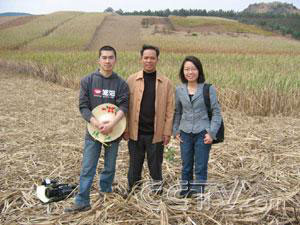Source: CCTV.com
03-11-2007 09:31
 |
Ethnic minority NPC deputy Li Mingfeng comes from China's southwestern Guang'xi Zhuang Autonomous Region. In today's segment of our "Across China" series, let's see how an NPC deputy performs his duty.
Walking in the sugarcane field, Li Mingfeng is in a somber mood. What he sees all around him are acres of sugarcane blighted by a severe drought.
Li Mingfeng is the only NPC deputy from Chong'zuo city, and his proposal this year concerns just these blighted sugarcane.
Li said, "Growing sugarcane provides the major source of income for farmers in Chong'zuo. But the drought has hit nearly half of all the sugarcanes grown in Chong'zuo, causing huge losses to farmers."
Chong'zuo is located in the southwestern part of Guang'xi Zhuang Autonomous Region. Like many less-developed places in western China, agriculture plays an overwhelming role in the livelihood of the local people. About 80 percent of the farmers are sugarcane growers. But droughty weather has for many years reduced their output.
Usually, when drought occurs, an effective irrigation system can help cushion the impact on agriculture. But most of the irrigation works in Chong'zuo were built some 40 to 50 years ago and are in very poor condition.
This is a reservoir which has been neglected for years. The dam was built in the 1950s. But due to lack of funds and maintenance, the reservoir no longer functioned properly. In Chong'zuo, about one fifth of all the reservoirs are suffering from the same fate.
Bad weather, plus shabby infrastructure, spells a disaster for local sugarcane growers.
Fifty-year-old Yuan Li'jiao farms on more than two acres of sugarcane field. This year, what she can expect is only half of the income she earned previously.
Yuan Lijiao, Chongzuo sugarcane farmer, said, "We can do nothing but to pray for some rain. This is the harshest drought in years."
But reduced yield is not the only blight. Lack of access to clean drinking water has become a chronic problem as well.
This pond provides the only water source for the forty-five households in a small village called Pai'bi. Local villagers wash their clothes and vegetables here. A well close to the pond is the main source of drinking water, and what it offers is hardly different from the dirty water in the pond.
Wei Caiguang, Chongzuo farmer, said, "Sometimes during the driest months, there would be no water in the well. Then we had to carry water from a reservoir miles away."
As an NPC deputy, Li Mingfeng goes to the countryside nearly every month, visiting farmers and trying to understand their concerns. He says Chong'zuo does not lack water resources. What it urgently NEEDS is an effective irrigation system.
Li said, "We should make full use of the water resource from the Zuo'jiang river to establish a new and effective irrigation system. I'm going to make a proposal during this year's NPC session about this."
Li Mingfeng arrived in Beijing a few days ago, bringing this as well as other proposals to the annual session.
Li said, "This is my fifth and last time attending the NPC session. I hope my proposals regarding rural development will get the attention and support from the relevant government departments."
It is through the efforts of such NPC deputies as Li Mingfeng that the country can better understand and address the concerns of its people.
Editor:Liu Fang
